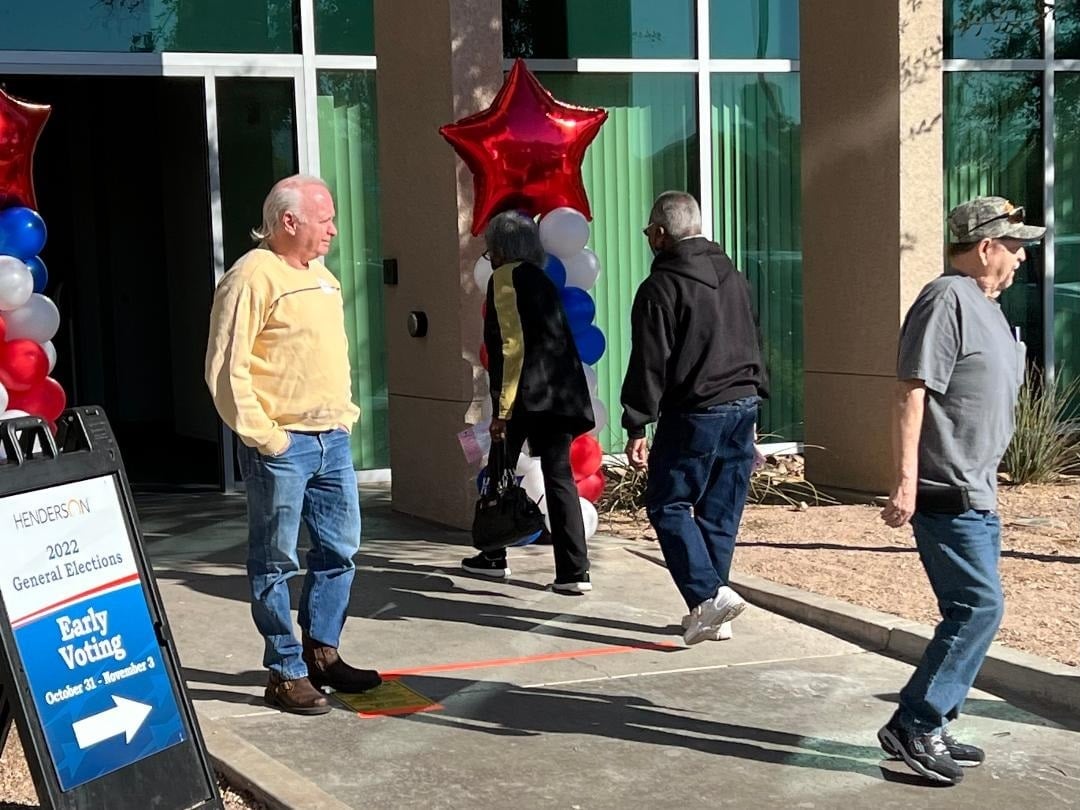LAS VEGAS (CN) — In the dynamic political environment of Nevada, the move from caucus to primary elections, coupled with the implementation of a dual electoral system, is significantly altering voter engagement and reshaping party strategies.
Democrats hope the transition will boost voter participation and simplify the electoral procedure, though it introduces considerable challenges — notably for the Republican Party. University of Nevada Las Vegas political science professor Ken Miller noted the limitations of caucuses, which aside from "being time-consuming and chaotic, often only reflect the views of the most active and extreme partisans."
Nevada's presidential primary takes place Feb. 6, though early voting kicked off Jan. 27 and goes through Friday. The Nevada Democratic Party endorsed the change, aimed at more inclusive participation akin to the general election setup.
On the other hand, the Nevada GOP will keep its traditional caucus on Feb. 8, a move that underscores a strategic preference for a controlled, participatory process for selecting the presidential nominee. "The Nevada GOP Caucus is the only place where presidential candidates can earn delegates to the Republican National Convention and become the GOP nominee to take on Joe Biden next November — make sure you come to the caucus and vote for your favorite candidate!" the party says on its website.
This approach has caused confusion among voters, especially in relation to Donald Trump's campaign strategy. Focusing on the caucus has allowed Trump to effectively gather Nevada's delegates, demonstrating his significant influence within the GOP. "Trump has consolidated his delegates in Nevada, with the GOP recognizing the caucus results for delegate allocation," Miller said.
Echoing her colleague's observations, Rebecca Gill, a University of Nevada Las Vegas professor specializing in elections, Nevada politics, and American constitutional law and policy, said, “It is essentially a certainty that Mr. Trump will sweep all of the delegates in Nevada. The caucus was designed to give Mr. Trump every advantage." This situation leaves little room for competition, especially with notable candidates like Nikki Haley opting out or suspending their campaigns.
Katharine Kurz, spokesperson for the Nevada State Democratic Party, criticized the Republican Party's steadfast loyalty to Trump, suggesting it highlights his dominance over the party. “Trump’s total control of the GOP is putting the squeeze on every one of these Republican Senate candidates to kiss the ring while escalating the nasty infighting in this divisive primary. Whoever makes it out of this mess will have to own and defend all of Trump’s baggage with independent voters for the rest of the campaign,” Kurz said.
The Nevada GOP notes caucuses have been the traditional method for selecting presidential nominees for many years. They counter claims of voter confusion by arguing the 2024 primary is a costly and unnecessary new process.
"Contrary to reports that the NVGOP is trying to confuse Nevada Republican voters, the truth is that the 2024 primary is an all new, very expensive, and meaningless process,” the party stated in their Nevada First in the West Caucus Info Sheet.
Despite a slight decrease in Nevada's voter registration in November 2023, numbers rebounded with an increase of 0.85% in December 2023, according to the Nevada secretary of state website. The Voter Registration & Election Management Solution (VREMS) signifies a $30 million initiative to enhance voter registration and election management accuracy across Nevada, with Secretary of State Francisco V. Aguilar anticipating a unified county election database by the 2024 elections.
Recent updates show a diversification in Nevada's voter registration, with active nonpartisan voters increasing by 9,121 (1.46%) — indicating a growing preference for non-affiliation. Meanwhile, the Democratic and Republican parties continue to gain support, alongside minor changes in smaller political parties' registration numbers.
With 1,924,000 active registered voters distributed across various affiliations, Nevada's evolving electoral landscape reflects the broader challenges and debates within the American electoral system, balancing between traditional caucus methods and the newer primary election.
Subscribe to Closing Arguments
Sign up for new weekly newsletter Closing Arguments to get the latest about ongoing trials, major litigation and hot cases and rulings in courthouses around the U.S. and the world.









